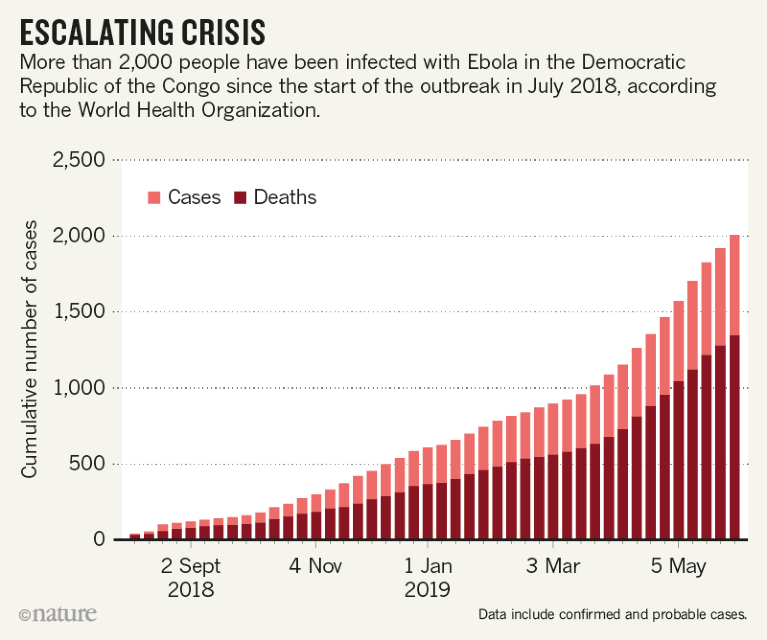EVENTS
Thousands march for Hungarian science Scientists and supporters marched through Budapest on 2 June to protest against a proposed law that would give the government control of Hungary’s leading research institutes. The proposal is the latest move in a battle between the government and the Hungarian Academy of Sciences (HAS), and part of a worrying trend of restricting academic freedom in the country, say the protesters. Last year, the government ordered a restructuring of Hungary’s research system, which mainly affects the roughly 40 institutes run by the HAS that do much of the country’s scientific research. The draft law, presented by research minister László Palkovics to the HAS on 27 May, would give the ministry control of the institutes and ownership of the academy’s properties. Palkovics, who did not respond to Nature’s requests for comment, says the changes will improve innovation. In a statement, the academy argues that the loss of autonomy works against the government’s aims, and that the property takeover is unconstitutional.

Credit: Bernadett Szabo/Reuters
Misconduct vote The US National Academy of Sciences (NAS) has approved an amendment to its by-laws that allows its governing council to expel members for misconduct, including proven cases of sexual harassment. Removing a member would require a two-thirds vote of the NAS’s governing council. Eighty-four per cent of academy members who voted on the amendment were in favour of it, and 16% opposed it. The NAS, which released the results on 3 June, declined to say how many of its 2,242 members who are eligible to vote had taken part. The amendment gives the governing council the power to develop a procedure for evaluating allegations that a member has violated the code of conduct, and to determine whether and how an accused member can appeal against the council’s decision. It also allows the council to change this process in the future.
POLITICS
Ministry merger South Africa’s president merged the government ministries for science and higher education in a cabinet overhaul on 29 May. The move is one of many departmental mergers designed to cut costs as the country struggles with slow economic growth and widespread poverty and unemployment. Blade Nzimande, who was removed as minister of higher education in 2017 in a cabinet reshuffle, will lead the joint department. Some academics are concerned that the country’s research system could be sidelined when pitted against the demands of higher education: South African universities have been struggling with protests calling for free education, and demands for racial transformation and to reduce the legacy of colonialism in the curriculum. But others see the merger as an opportunity to streamline the country’s science, technology and innovation system. Nzimande will also guide the construction of South Africa’s part of the Square Kilometre Array, a project to build the world’s largest radio telescope in South Africa and Australia.
POLICY
Cell therapy in China An international group of stem-cell researchers is urging China to cancel draft regulations that would permit some hospitals to sell therapies developed from patients’ own cells, without approval from the nation’s drug regulator. The International Society for Stem Cell Research (ISSCR) wrote to Jiao Hong, director of China’s National Medical Products Administration in Beijing, on 20 May outlining its concerns. The law could encourage hospitals to sell people unsafe and ineffective treatments, says the ISSCR, which could cause harm and discredit the international standing of the Chinese regenerative-medicine community. Under the proposal, which was released in March, select hospitals will be allowed to sell cell therapies — which are made from human cells, often from the immune system, to treat diseases such as cancer — without first testing the treatments in large numbers of people. The law is expected to come into effect over the next few months, although it is unclear whether further changes will be made.
Huawei ban The Institute of Electrical and Electronics Engineers (IEEE) said on 2 June that it was rescinding its 29 May decision to ban employees of Huawei, the Chinese telecommunications company, from serving as peer reviewers or editors on scientific papers submitted to the society’s publications. The IEEE, based in New York City, publishes nearly one-third of the world’s technical literature. The ban had prompted Haixia Zhang, a micro- and nanotechnologies researcher at Peking University in Beijing, to resign from the editorial boards of two IEEE journals in protest. And the China Computer Federation, a technology research group in Beijing, cut ties with the society’s publications division on 30 May. The ban came after a mid-May decision by the US Department of Commerce that placed Huawei on a list of companies that had to obtain government permission before buying or acquiring US technology. The IEEE said that it was attempting to “comply with its legal obligations” under US law, but decided to reverse the ban after getting clarification from the commerce department.

Credit: Fred Dufour/AFP/Getty
PhD policy review PhD students in India will no longer be required to publish articles in academic journals before they are awarded their doctorates, if the country’s higher-education regulator adopts recommendations from a committee of researchers. The University Grants Commission (UGC) currently requires PhD students to publish at least one article in a peer-reviewed journal and to present two papers at conferences or seminars before they submit their doctoral thesis for marking. But last year, the UGC appointed a committee to examine this requirement, among others. The committee suspects that the publishing requirement has contributed to a rise in poor-quality journals that offer to publish papers quickly for a fee, without providing services such as peer review, says Padmanabhan Balaram, chair of the committee and a biochemist at the Indian Institute of Science in Bengaluru. The committee has recommended that the UGC require universities to assess PhD candidates by holding an examination midway into a PhD programme, and that it require candidates to defend their thesis in an oral examination, Balaram says. The UGC is expected to respond to the committee’s recommendations in June.
PUBLISHING
Plan S delayed The funders behind Plan S, a bold push to make the research they fund freely available to all, have delayed the start of the initiative by one year to allow scientists and academic publishers time to adapt to the demands. On 31 May, the 19 mainly European funding agencies that support the initiative released the final details describing how researchers can comply with their mandate, which now says that, from 1 January 2021, results of research funded by the agencies must be open access on publication. The Plan S funders also say that they will focus on changing the academic assessment system and that, when making funding decisions, they will disregard the prestige of journals in which researchers publish. The changes come six months after the funders issued a draft document about how the plan will work, for public scrutiny. The consultation received more than 600 responses.
HEALTH
HIV outbreak Around 550 teenagers and children — many younger than 5 — have tested positive for HIV in Larkana, southeastern Pakistan, within the past two months. Before this outbreak, there were roughly 1,200 HIV-positive children across the country. On 28 May, epidemiologists with the World Health Organization arrived in Pakistan to investigate the surge in cases in young people, and to help with the response by screening individuals for the virus and starting people on HIV treatments. Although the source of the outbreak has yet to be confirmed, Pakistan’s government suspects that, on the basis of the unusually young age of those infected, the virus has spread through the use of unclean needles and improperly screened blood transfusions offered at medical clinics. According to several officials leading the response, the reuse of syringes is rampant in Larkana because health clinics lack supplies.
TREND WATCH
The number of cases of Ebola virus in the Democratic Republic of the Congo has doubled in just over two months, according to the World Health Organization (WHO). An estimated 2,008 people have been infected with Ebola in the North Kivu and Ituri provinces since the start of the outbreak in late July 2018, and 1,346 of those individuals have died. The numbers represent a rapid escalation of the crisis since the outbreak passed the 1,000-case mark on 24 March. “I’m profoundly worried,” Tedros Adhanom Ghebreyesus, the WHO’s director-general, told Nature in May. He attributes the failure to end the outbreak to mistrust of and assaults on Ebola-response workers — problems that have worsened this year. Mistrust of health workers makes it difficult for them to perform key duties, such as convincing people to send their family members to treatment centres and persuading people to receive an experimental Ebola vaccine. The danger posed by attacks also prevents responders from working in communities and tracking contacts of people who have contracted the disease, resulting in infections among people who weren’t being monitored.

Source: World health Organization



